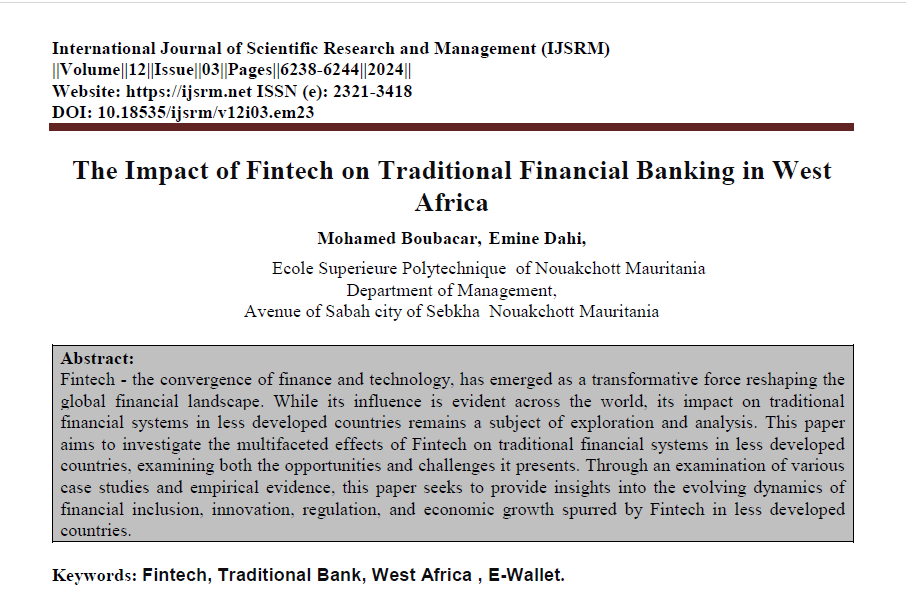
Submission to VIJ 2024-03-28
Keywords
- Fintech, Traditional Bank, West Africa , E-Wallet.
Copyright (c) 2024 Mohamed Boubacar, Emine Dahi

This work is licensed under a Creative Commons Attribution 4.0 International License.
Abstract
Fintech, the convergence of finance and technology, has emerged as a transformative force reshaping the global financial landscape. While its influence is evident across the world, its impact on traditional financial systems in less developed countries remains a subject of exploration and analysis. This paper aims to investigate the multifaceted effects of fintech on traditional financial systems in less developed countries, examining both the opportunities and challenges it presents. Through an examination of various case studies and empirical evidence, this paper seeks to provide insights into the evolving dynamics of financial inclusion, innovation, regulation, and economic growth spurred by fintech in less developed countries.
References
- Arner, D. W., Barberis, J. N., & Buckley, R. P. (2015). The Evolution of Fintech: A New Post-Crisis Paradigm? University of Hong Kong Faculty of Law Research Paper No. 2015/047.
- Beck, T., Demirgüç-Kunt, A. & Singer, D. (2013). Is Financial Inclusion a Prerequisite for Financial Development and Economic Growth? Policy Research Working Paper No. 6812, World Bank Group.
- Mbiti, I. & Weil, D. (2015). Mobile Banking: The Impact of M-Pesa in Kenya. National Bureau of Economic Research.
- World Bank Group (2020). Global Findex Database 2017: Measuring Financial Inclusion and the Fintech Revolution. World Bank Publications.
- Allen, F., Carletti, E., Cull, R., Qian, J., Senbet, L. & Valenzuela, P. (2020). The African Financial Development and Financial Inclusion Gaps. Review of Finance, 24(3), 715-748.
- Demirgüç-Kunt, A., Klapper, L., Singer, D., Ansar, S. & Hess, J. (2018). The Global Findex Database 2017: Measuring Financial Inclusion and the Fintech Revolution. World Bank Group.
- Donou-Adonsou, F., Faye, I. & Mas, I. (2017). The Promises of Digital Finance: Reducing Inequality in the MENA Region. CGAP Focus Note, No. 117.
- Mas, I. & Kumar, K. (2008). Banking on Mobiles: Why, How, for Whom? CGAP Focus Note, No. 48.
- G20/OECD Task Force on Financial Consumer Protection. (2016). G20 High-Level Principles for Digital Financial Inclusion.
- Gai, K., Qiu, M. & Sun, X. (2018). Fintech innovation and SME financing: Evidence from China. Journal of Internet Banking and Commerce, 23(2), 1-15.
- Hasan, I., Kobeissi, N. & Liu, L. (2018). The impact of Fintech on SME and retail banking. Journal of Business Research, 92, 416-420.
- Herce, M. A., Mauro, P. & Rudolph, H. P. (2018). Financial deepening, trade finance, and SMEs: Firm-level evidence from a major emerging market. Journal of Banking & Finance, 88, 430-448.
- IFC. (2019). SME finance policy guide: Good practices for regulators.
- Lee, N. (2017). A review of the theories of corporate social responsibility: Its evolutionary path and the road ahead. International Journal of Management Reviews, 19(2), 153-182.
- Maimbo, S. M. & Meagher, P. (Eds.). (2019). Financial inclusion in Africa. Routledge.
- Mian, A. & Santos, J. A. (2017). Fintech credit markets around the world: size, drivers and policy issues. BIS Quarterly Review, September 2017.
- Mishra, S. & Das, P. (2018). Impact of Fintech on banking and financial services. Journal of Management Sciences and Technology, 6(2), 154-163.
- Mohamed, A. H. & Sidi Mohamed, O. (2019). Challenges of SMEs Financing in Mauritania: Analysis and Solutions. Journal of Business and Economics, 10(1), 12-25.
- OJK. (2018). Fintech lending: Challenges and opportunities for inclusive finance in Indonesia.
- Ould Abdi, H. (2019). Financing Options for SMEs in Mauritania: A Comparative Analysis. African Journal of Business and Management, 8(4), 78-92.
- Ould Ahmed, A. (2018). The Role of Microfinance Institutions in SME Financing: Evidence from Mauritania. Journal of African Economics, 25(3), 178-192.
- Ould Ahmedou, B. (2018). Access to Finance for SMEs in Mauritania: Challenges and Opportunities. African Development Bank Group.
- CGAP (Consultative Group to Assist the Poor). (2018). Fintechs in China and East Asia: Overview of Financial Inclusion, Regulation, and Policy Trends. CGAP Focus Note, No. 124.
- Honohan, P. & King, M. (2012). Development of National Payment Systems: A Handbook. World Bank Publications.
- Kwak, J. & Hwang, K. (2016). The Impact of Fintech Startups on Incumbent Retail Banks’ Share Prices. Journal of Internet Banking and Commerce, 21(3), 1-20.
- Mashamba, T. & Gani, S. (2023) Fintech, Bank Funding, and Economic Growth in Sub-Saharan Africa, Cogent Economics & Finance. 11(1), 2225916, DOI: 10.1080/23322039.2023.2225916
- Otonne, A., & Ige, O. T. (2023) ‘Exploring the influence of financial technology on banking services in Nigeria’. International Journal of Financial, Accounting, and Management, 5(3), 323-341.
- World Bank Group (2019). The State of Fintech in Developing Countries: Insights from Fintech Innovators in 10 Countries. World Bank Group.